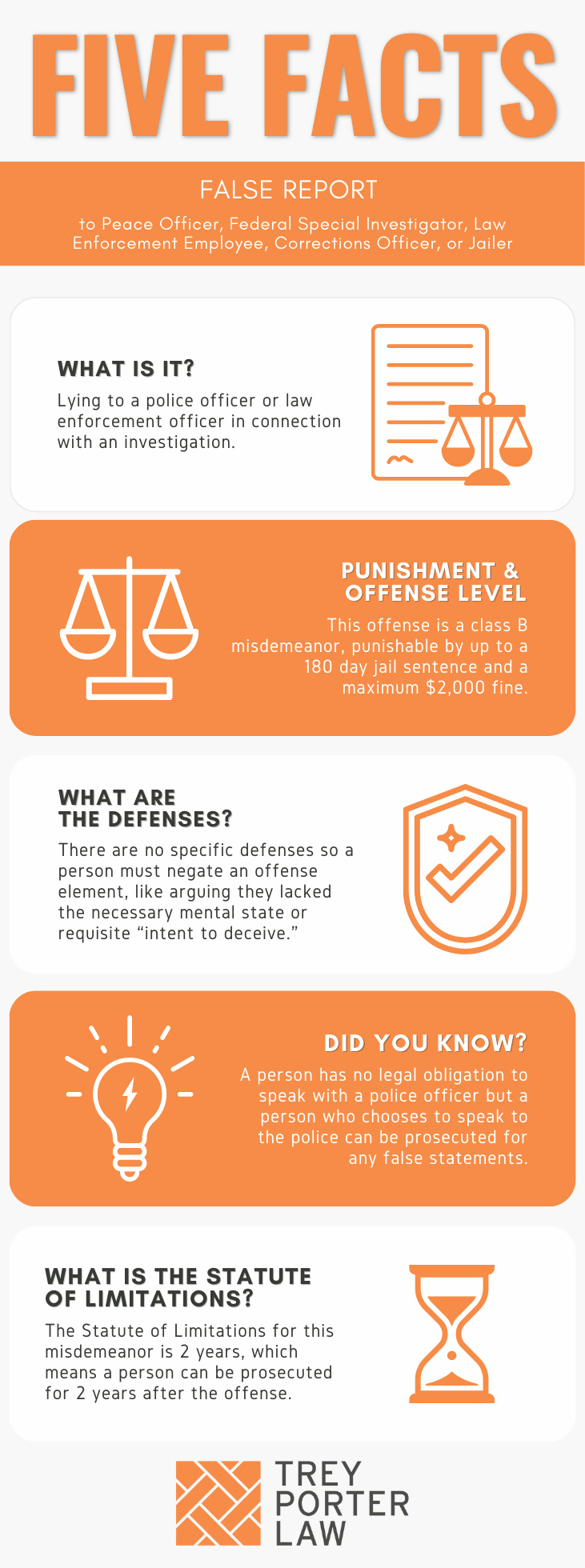WHAT IS FALSE REPORT TO PEACE OFFICER, FEDERAL SPECIAL INVESTIGATOR, LAW ENFORCEMENT EMPLOYEE, CORRECTIONS OFFICER, OR JAILER IN TEXAS?
The Texas law against making a false report to a peace officer, federal special investigator, law enforcement employee, corrections officer, or jailer prohibits knowingly giving a false statement that is material to a criminal investigation.

WHAT IS THE FALSE REPORT TO PEACE OFFICER, FEDERAL SPECIAL INVESTIGATOR, LAW ENFORCEMENT EMPLOYEE, CORRECTIONS OFFICER, OR JAILER LAW IN TEXAS?
Tex. Penal Code § 37.08. FALSE REPORT TO PEACE OFFICER, FEDERAL SPECIAL INVESTIGATOR, LAW ENFORCEMENT EMPLOYEE, CORRECTIONS OFFICER, OR JAILER.
(a) A person commits an offense if, with intent to deceive, he knowingly makes a false statement that is material to a criminal investigation and makes the statement to:
(1) a peace officer or federal special investigator conducting the investigation;
(2) any employee of a law enforcement agency that is authorized by the agency to conduct the investigation and that the actor knows is conducting the investigation; or
(3) a corrections officer or jailer.
. . .
(c) An offense under this section is a Class B misdemeanor.
WHAT IS THE PENALTY CLASS FOR FALSE REPORT TO PEACE OFFICER, FEDERAL SPECIAL INVESTIGATOR, LAW ENFORCEMENT EMPLOYEE, CORRECTIONS OFFICER, OR JAILER IN TEXAS?
Making a false report to a peace officer, federal special investigator, law enforcement employee, corrections officer, or jailer is a Class B misdemeanor, punishable by up to 180 days in county jail.
WHAT IS THE PUNISHMENT RANGE FOR FALSE REPORT TO PEACE OFFICER, FEDERAL SPECIAL INVESTIGATOR, LAW ENFORCEMENT EMPLOYEE, CORRECTIONS OFFICER, OR JAILER IN TEXAS?
The punishment range for making a false report, a Class B misdemeanor, is up to 180 days in jail, and a maximum $2,000 fine.
WHAT ARE THE PENALTIES FOR FALSE REPORT TO PEACE OFFICER, FEDERAL SPECIAL INVESTIGATOR, LAW ENFORCEMENT EMPLOYEE, CORRECTIONS OFFICER, OR JAILER IN TEXAS?
A person charged with false report may be eligible for probation after a conviction, or deferred adjudication to avoid a conviction, for a period not to exceed two years.
WHAT ARE THE DEFENSES TO FALSE REPORT TO PEACE OFFICER, FEDERAL SPECIAL INVESTIGATOR, LAW ENFORCEMENT EMPLOYEE, CORRECTIONS OFFICER, OR JAILER IN TEXAS?
The statute does not authorize specific defenses to false report. A person accused of making a false report may attempt to negate at least one of the elements the State must prove at trial. For example, a defendant may argue he or she lacked the intent to deceive, or that the false statement was not material.
- What is a statement that is “material to a criminal investigation” in the Texas false report law? Texas courts interpreting the law against false report apply the ordinary usage and common meaning of “material.” If a person’s statements are a relevant and essential component of an investigation, they are material within the meaning of the law.
- Can a person be charged with false report if he or she believed the information reported was true? Texas law requires a person to knowingly make a false statement to police with the intent to deceive. If a person believes the statements were true, the false statements were neither made knowingly, nor with intent to deceive.When a person reports police or other official misconduct specifically, the State must show the defendant made representations in bad faith. These additional requirements safeguard a person’s constitutional right to petition the government for redress of grievances.For example, in Zahorik v. State, the defendant reported identity theft after learning of an unauthorized credit check. It was later revealed a Tennessee law enforcement agency ran his credit report without authorization, but it was to find out more information about the defendant, rather than to steal his identity. He was convicted of falsely reporting identity theft, but the appellate court reversed. Because law enforcement did in fact illegally run a credit report, there was no proof the defendant acted in bad faith by reporting suspected identity theft.
WHAT IS THE STATUTE OF LIMITATIONS FOR FALSE REPORT TO PEACE OFFICER, FEDERAL SPECIAL INVESTIGATOR, LAW ENFORCEMENT EMPLOYEE, CORRECTIONS OFFICER, OR JAILER IN TEXAS?
The limitation period for making a false report, a Class B misdemeanor, is two years.
FALSE REPORT TO PEACE OFFICER, FEDERAL SPECIAL INVESTIGATOR, LAW ENFORCEMENT EMPLOYEE, CORRECTIONS OFFICER, OR JAILER IN TEXAS
Making a false report to a peace officer, federal special investigator, law enforcement employee, corrections officer, or jailer criminalizes knowingly making false statements to law enforcement. The purpose of this law is to protect the integrity of the investigatory process, ensure police availability for real criminal activity, and protect others from false accusations.
TEXAS FALSE REPORT TO PEACE OFFICER, FEDERAL SPECIAL INVESTIGATOR, LAW ENFORCEMENT EMPLOYEE, CORRECTIONS OFFICER, OR JAILER COURT CASES
The case law regarding false report to peace officer, federal special investigator, law enforcement employee, corrections officer, or jailers in Texas explains the materiality requirement.
- In McCreary v. State, the defendant was convicted of making a false report after she told police her ex-husband assaulted her by pulling her into his car, elbowing her, and holding her down. The ex-husband showed officers a video he recorded of the incident, which revealed the defendant lied to police. The appellate court affirmed her conviction. Police officers investigating a potential assault try to obtain each person’s side of the story, so the defendant’s false statements were a relevant and essential component of the investigation.
















